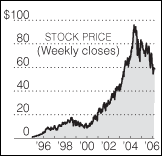Maureen Lane
Predatory Learning?
Tuesday, the New York Times reported that the University of Phoenix has become the nation's largest private university with over 300,000 students, and that it has done so "by delivering high profits to investors and a solid, albeit low-overhead, education to mid-career workers seeking college degrees."
Not only is the University of Phoenix the largest, but it is the most profitable in an industry that is booming of late. Take a look at this New York Times graphic showing stock prices for for-profit higher education companies:

Clearly, the University of Phoenix is a turning a profit. What's problematic about this is that the marketing of degrees and certificates can snare students into costly loans and subsume the mission of higher learning to commercial interests.
When I came to Hunter College 10 years ago, I was over forty years old. I did not know about college or financing it. I was fortunate to attend Hunter College of the City University of New York and pursue a liberal arts bachelors' degree. A good many other low-income students like me were enticed by advertising from for-profit universities that pushed many of my friends to borrow to the limit the government is willing to subsidize in order to finance their degrees.
The Times similarly reports that in the University of Phoenix case, 'Many students accuse recruiters of misleading them, and the university's legal troubles trace back to similar accusations of recruitment abuses. In 2003, two enrollment counselors in California filed a whistle-blower lawsuit in federal court accusing the university of paying them based on how many students they enrolled, a violation of a federal rule. After the lawsuit was filed, the Department of Education sent inspectors to California and Arizona campuses. The department's report, which became public in 2004, concluded that the university had provided incentives to recruit unqualified students and "systematically operates in a duplicitous manner."
The Phoenix case has implications for public discourse and public policy. The more our economy demands the skills and credentials of college and higher degrees, the more people - students, professors, employers - are susceptible and coerced by aggressive markets and marketing.
What also worries me with many for-profit higher education models is my belief that the college experience should include a community experience, a relational experience - not be limited to isolated online learning. Attending classes has given me the chance for instruction and the benefit of seeing techniques and procedures modeled for me by professors. This has been one of the most beneficial aspects of my higher education.
Opening access to higher education is not the question. It's clear from my previous work and from my own life experiences that I firmly believe that breaking down barriers to education (like expensive childcare, too little federal funding, and welfare work requirements that don't include the hours many spend studying and in the classroom) allows many to permanently pull themselves out of poverty. Studies have overwhelmingly shown this as well - college leads to financial security.
But on the topic of for-profit colleges, it's hard to see such widespread access to college packaged with unscrupulous recruitment tactics, maxed-out loans and grants, and pitifully low graduation rates. The question, then, is about the quality of education in which the students, faculty and the community are involved.
For-profit education in numbers:
-Student borrowers graduating in 2004 from for-profit colleges had the highest median debt of $24,600, followed by private nonprofit college graduates at $19,500, and public four-year college graduates at $15,500. Source.
-Phoenix University received $1.8 billion in federal student aid in the 2004-2005 school year, making it the for-profit university "giant." Source.
-Phoenix University has a graduation rate of 16%, significantly lower than the national average of 55%. Source.
Maureen Lane: Author Bio | Other Posts
Posted at 11:13 AM, Feb 15, 2007 in
Economic Opportunity
Permalink | Email to Friend










